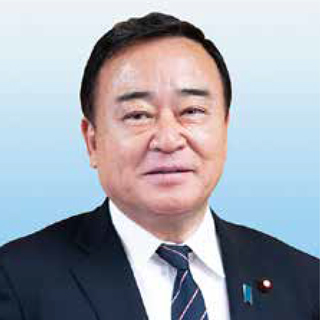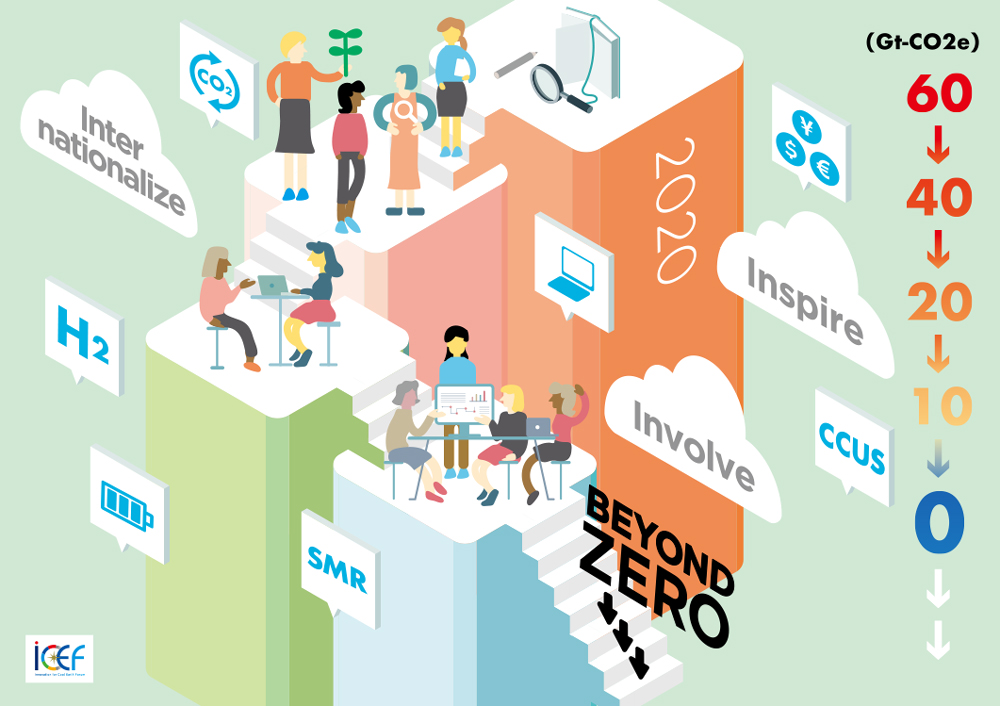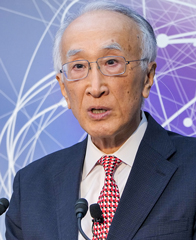
Minister of Economy, Trade and Industry

Japan has committed to carbon neutrality by 2050. We are also targeting “Beyond Zero”–turning CO2 emissions negative. We will achieve this through a “positive cycle of economic growth and environmental protection,” with innovation as a main source of growth. Our Environment Innovation Strategy promotes R&D and demonstrations of new technologies and combines already existing technologies to create new markets and enhance societal acceptance. We hope ICEF will illuminate the path to “Beyond Zero” by deepening stakeholder dialogue and communicating Japan’s efforts globally.
he Covid-19 pandemic has driven down economic growth–but it has also driven down emissions. The imperative now is to flip the equation and find a way to combine those emission reductions with economic growth instead. The public mood is supportive. “In the pandemic, we received ‘soft benefits’ like blue skies and clean air which put people in touch with the idea of transitioning to a net-zero future,” commented Tom Delay, Carbon Trust chief executive. In an encouraging sign, climate-friendly businesses like electric vehicles and renewable energy proved resilient in the downturn. Nonetheless, any rapid move to a carbon-neutral future will require unprecedented cooperation between finance, government and business.
The good news is that governments are incorporating green thinking into their Covid-19 recovery stimulus packages. Speakers pointed to China’s pledge of carbon neutrality by 2060, California’s 2035 ban on the sale of new internal-combustion-engine vehicles, and the European Union’s Green Deal.
Japan’s aim in hosting the six conferences of “Tokyo Beyond Zero Week” was to make a similarly impactful contribution to addressing climate change. And a little over two weeks after ICEF 2020, on October 26, Japan announced a goal of carbon neutrality by 2050.
Still, the road ahead remains challenging. Jon Moore, BloombergNEF CEO, pointed out that of global stimulus packages worth $12 trillion, just 1% was targeted at green initiatives–versus 7% for carbon-intensive industries. The financial sector is also lagging. Capital markets are failing to serve sustainable technology innovation because they see it as “too risky, too long-term and with transactions too small to generate big fees,” argued Mungo Park, chair of Innovator Capital. Meanwhile the fact that breakthroughs needed for deep decarbonisation have no “natural owner”–meaning there is no one pre-existing industry to drive technological change–is another bottleneck.
Against this backdrop, can the world innovate fast enough to stave off catastrophe? The solution, says Mark Lewis, BNP Paribas’ global head of sustainability research, is to find the right combination of public policy incentives to trigger a “virtuous feedback loop,” where policy attracts private capital, driving economies of scale and technological breakthrough, which in turn lead to falling costs and the setting of more ambitious policy targets.
“We already know how to scale up finance to achieve decarbonisation breakthrough,” said Lewis. “We’ve done it with renewable energy. We can apply the same lessons in the hydrogen arena.” Building up Europe’s hydrogen economy by 2030, he added, would cost around $400 billion–a figure equivalent to just 3% of the bloc’s annual GDP.
Innovations in nuclear power were also in the spotlight. Attention was drawn to the paradoxes in the nuclear debate. The environmental movement opposes nuclear energy because of the burden it places on future generations in the form of nuclear waste–something fossil fuels also do, albeit in the form of climate change. Since the energy transition to wind and solar represents an exceptional downward shift to less reliable and more energy-diffuse fuels, nuclear needs a place at the table. Park referred enthusiastically to new Japanese-American nuclear energy technology, where the GE Hitachi X300, using Lightbridge fuel, will operate at 300°C (“the same temperature as a pizza oven”), eliminate 94% of the pollution and produce 30% more electricity. “There’s a new nuclear age and Japan’s a huge player,” he declared.
Bold breakthroughs are often driven by government-funded research and international collaboration. This was the message of Akira Yoshino, Nobel Laureate and head of Japan’s Global Zero Emission Research Center. “We cannot solve climate change with a single technology,” he said. “We must fuse multiple technologies and cooperate internationally.” Yoshino pointed to RD20, a Tokyo- based conference that brings together leading G20 researchers, as a successful example of cross-border exchange.
Not every shift to net zero, however, has to be radical and non-linear. An example of more gradual change was given by Fiona Reynolds, CEO of PRI, who described how the European oil majors have responded to investor engagement by starting to invest in solar, wind and electricity generation.

Mobilising women is one key way to accelerate climate-change response. Laurence Tubiana, European Climate Foundation CEO, noted the effectiveness of women in building momentum by speaking “with determination and emotion to get us to act.” The Sasakawa Peace Foundation’s Ayaka Matsuno unveiled a study showing that achieving the critical mass of 30% or more women on boards makes a real difference to companies’ climate governance and ability to innovate. Other speakers pointed to women’s higher representation in renewables versus the traditional, male-dominated energy sector as another sign of their increasing importance in the climate-change battle.
CEO, Tanaka Global, Inc.; Former Chairman, The Sasakawa Peace Foundation (SPF); Former Executive Director, International Energy Agency (IEA); Chair, ICEF Steering Committee

Covid-19 has accelerated the trend to decarbonisation. During the pandemic, power generation from renewables rose while it fell from fossil fuels. Fatih Birol, International Energy Agency (IEA) executive director, is optimistic about decarbonisation for three reasons: the cost of renewables is lower, current interest rates make big-project financing affordable and governments are setting bold targets. Of the IEA’s four clean-energy technologies, hydrogen–which can decarbonise transport, power generation and industry–attracted the greatest interest at ICEF. Gender equality is another focus and we have almost 50 percent female speakers at this event. Let’s hope that 2019 marked a peak in global emissions and we are on the path to achieve long-term climate goals.
| Nobuo Tanaka(Moderator) | CEO, Tanaka Global, Inc.; Former Chairman, The Sasakawa Peace Foundation (SPF); Former Executive Director, International Energy Agency (IEA) |
|---|---|
| Eija-Riitta Korhola | Delegate of the Consultative Commission on Industrial Change; Advisor in the EU Affairs |
| Inkar Kadyrzhanova | Regional gender and climate change adviser, UN Women regional office for Asia and the Pacific |
| Kathy Matsui | Japan Vice-Chair/Chief Japan Equity Strategist, Goldman Sachs |
| Laurence Tubiana | CEO, European Climate Foundation |
| Ayaka Matsuno | Director, Gender Investment and Innovation Department, The Sasakawa Peace Foundation (SPF) |
| Jon Moore (Moderator) | Chief Executive Officer, BloombergNEF |
|---|---|
| Aleksandra Tomczak | Member of Cabinet of the Executive Vice President, the European Commission Frans Timmermans in charge of the European Green Deal |
| Isabelle Laurent | Deputy Treasurer and Head of Funding, European Bank for Reconstruction and Development (EBRD) |
| Mark Christopher Lewis | Global Head of Sustainability Research, BNP Paribas Asset Management |
| Mungo Park | Founder and Chair, Innovator Capital Limited (ICL) |
| Kenji Yamaji(Moderator) | Senior Vice President/Director-General, Research Institute of Innovative Technology for the Earth (RITE); Professor Emeritus, The University of Tokyo |
|---|---|
| Fiona Reynolds | Chief Executive Officer – Principles for Responsible Investment (PRI) |
| Manfred Fischedick | Scientific Managing Director, Wuppertal Institute for Climate, Environment & Energy |
| Tom Delay CBE | Chief Executive, The Carbon Trust |
| Akira Yoshino | Director, Global Zero Emission Research Center (GZR), National Institute of Advanced Industrial Science and Technology (AIST) |
| Sally M Benson (Chair) | Professor, Department of Energy Resources Engineering, School of Earth, Energy & Environmental Sciences, Stanford University; Co-Director, Precourt Institute for Energy, Stanford University |
|---|---|
| François-Régis Mouton | Regional Director Europe, International Association of Oil & Gas Producers (IOGP) |
| Sunita Satyapal | Director, Hydrogen and Fuel Cell Technologies Office, Office of Energy Efficiency and Renewable Energy, U.S. Department of Energy |
| Akira Yabe | Fellow, Energy System & Hydrogen Unit, Technology Strategy Center (TSC), New Energy and Industrial Technology Development Organization (NEDO) |
| Richard K. Lester (Chair) | Associate Provost, Massachusetts Institute of Technology |
|---|---|
| Ashley Finan | Director, National Reactor Innovation Center |
| Jill Engel-Cox | Director, Joint Institute for Strategic Energy Analysis (JISEA) at National Renewable Energy Laboratory (NREL) |
| Eri Nakatani | Deputy Director, Nuclear Energy Policy Planning Division, Agency for Natural Resources and Energy, Ministry of Economy, Trade and Industry |
| William Magwood | Director-General, OECD Nuclear Energy Agency (NEA) |
| Nebojsa Nakicenovic (Chair) | Executive Director, The World in 2050 (TWI2050) |
|---|---|
| Anna Piperal | Managing Director, e-Estonia Briefing Centre, Enterprise Estonia |
| Yumiko Iwafune | Project Professor, Institute of Industrial Science, The University of Tokyo |
| Satoshi Yamazaki | Managing Director, Accenture |
| Georg Erdmann(Chair) | Retired Professor for Energy Systems, Berlin University of Technology; President of the Board, KSB Energie AG, Berlin |
|---|---|
| Aruturo Ardila-Gomez | Global Lead for Urban Mobility and Lead Transport Economist, World Bank |
| Brian Motherway | Head of Energy Efficiency, International Energy Agency) |
| Yoshitsugu Hayashi | President, The Japanese Association of The Club of Rome |
| David Sandalow (Chair) | Inaugural Fellow, Center on Global Energy Policy, Columbia University; Co-Director, Energy and Environment Concentration, School of International and Public Affairs, Columbia University |
|---|---|
| A.-H. Alissa Park | Director of the Lenfest Center for Sustainable Energy, Columbia University |
| Andrea Ramírez Ramírez | Professor, Chair Low Carbon Systems and Technologies/Faculty of Technology, Policy and Management, Delft University of Technology |
| Jennifer Holmgren | CEO of LanzaTech |
| Ziqiu Xuez | Chief Researcher, CO2 Storage Research Group, Research Institute of Innovative Technology for the Earth (RITE) |
| Itaru Yasui(Chair) | Honorary Adviser, National Institute of Technology and Evaluation (NITE); Emeritus Professor, The University of Tokyo; Honorary Adviser, Institute for Promoting Sustainable Societies |
|---|---|
| Brendan Vidal Edgerton | Director, Circular Economy, World Business Council for Sustainable Development (WBCSD) |
| Hideyuki Dohi | Director General, Environment and Green Chemistry Unit, Technology Strategy Center (TSC), New Energy and Industrial Technology Development Organization (NEDO) |
| Lynette Chung | CSO, Head of Global Sustainability, Covestro AG |
| Kiyotaka Tahara | Director, Research Laboratory for IDEA, Research Institute of Science for Safety and Sustainability, National Institute of Advanced Industrial Science and Technology (AIST) |
| Atsushi Sunami(Chair) | President, The Sasakawa Peace Foundation (SPF); President, The Ocean Policy Research Institute of SPF; Director, SciREX Center, Executive Advisor to the President, National Graduate Institute for Policy Studies (GRIPS); Guest Professor, Research Organization for Nano & Life Innovation, Waseda University |
|---|---|
| Karsten Stoltenberg | Country Manager Japan, Equinor New Energy Solutions |
| Mark Leybourne | Senior Energy Specialist, Energy Sector Management Assistance Program (ESMAP), World Bank |
| Ngedikes Olai Uludong | Permanent Representative of Palau to the United Nations |
| Masato Yamada |
Vice President, Regional Manager, Asia Pacific, MHI Vestas Offshore Wind |
| Ajay Mathur (Chair) | Director General, The Energy and Resources Institute (TERI); Member of the Prime Minister’s Council on Climate Change |
|---|---|
| Nuki Agya Utama | Executive Director of the ASEAN Centre for Energy (ACE) |
| P. C. Maithani | Adviser, Ministry of New and Renewable Energy, Government of India |
| Tareq Emtairah | Director, Department of Energy, United Nations Industrial Development Organization (UNIDO) |
| Tony Clamp | Director of the Green Climate Fund’s Private Sector Facility |
| Ismail Serageldin (Chair) | Emeritus Librarian of Alexandria; Founding Director of the Library of Alexandria |
|---|---|
| Chris Argent | Head of Business Sustainability, APAC Region, Syngenta AG |
| David Rosenberg | CEO and Co-Founder of AeroFarms |
| Miyuki Iiyama | Director, Research Strategy Office, Japan International Research Center for Agricultural Sciences (JIRCAS) |
| Olivier Dubois | Senior Natural Resources Officer, Office of Climate, Biodiversity and Environment, FAO |
| S. Julio Friedmann (Chair) | Senior Research Scholar, Center for Global Energy Policy at Columbia University |
|---|---|
| Lori Guetre | Vice President, Business Development, Carbon Engineering Ltd. |
| Roger Ainesn | Energy Program Chief Scientist for Global Security E Program, Energy and Homeland Security, Lawrence Livermore National Laboratory (LLNL) |
| Yasuhito Shirato | Director, Climate Change research, Institute for Agro-Environmental Sciences, The National Agriculture and Food Research Organization (NARO) |
| Tiffany Troxler | Associate Professor, Earth and Environment Department, Florida International University |





